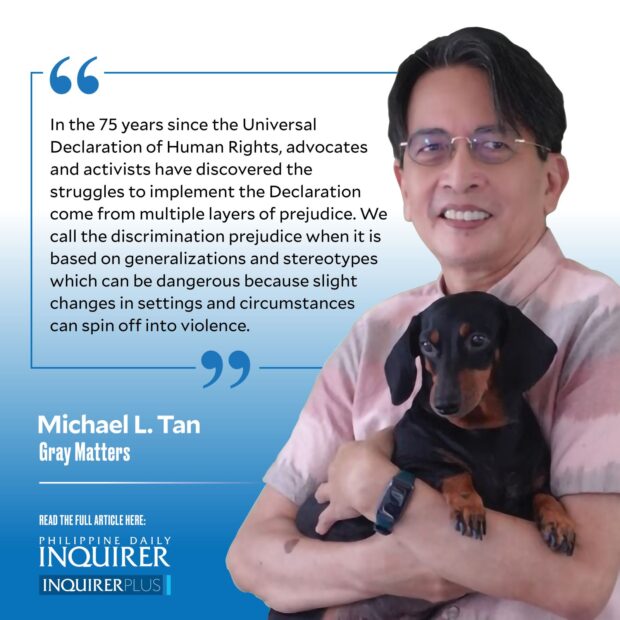Human ‘na,’ rights ‘pa’

We’ve heard the stories, or experienced it ourselves, especially in relation to job applications. People better qualified than others for a job but who don’t get it simply because they’re female (or, worse, trans), or they’re too tall or too short even if the height has nothing to do with the job.
Seventy-five years after the Universal Declaration of Human Rights (UDHR), the product of centuries of humanist struggles that recognize the inherent worth of every human being, there are just too many buts and qualifiers, what I call the “na” and “pa” in Tagalog.
Na? Pa? Not nanay and papa but they may as well be, such qualifiers being the parents of discrimination.
Article continues after this advertisementLast Saturday I had to give a talk to media practitioners alerting them to sensitivities around reporting on HIV/AIDS, especially people living with HIV/AIDS.
One word, “AIDS,” brings judgment: people who were infected because they are what they are. It used to be one-dimensional: bakla kasi, sex worker kasi, even Kano kasi (“Kano” here to mean “Westerner”), is the reason one gets AIDS, all associated with sex and, let’s face it, the idea that “those people” have too much sex and that alone is used to argue, “They don’t deserve any kind of care.”
In the 75 years since the UDHR, advocates and activists have discovered the struggles to implement the Declaration come from multiple layers of prejudice.
Article continues after this advertisementWe call the discrimination prejudice when it is based on generalizations and stereotypes which can be dangerous because slight changes in settings and circumstances can spin off into violence, as we saw during the height of the COVID epidemic, where no less than former United States president Donald Trump blamed the outbreak on the Chinese, which then became “Asians” in general, including Filipinos.
The bloody war on drugs was another example, directed against the poor, who were already deprived of so many services that would have prevented the drug problem in the first place. Instead of remedying the discrimination, the “solution” came in the form of deadly bullets breaking the silence of the night.
Discrimination can exist even within the already oppressed groups. Class is an important variable here, as we see in the way upper-class women can sometimes be so very vicious in depriving poor women of their rights.
Class divides LGBT+ groups as well; for example, parents will tell gay sons and lesbian daughters “I accept you, but please do not be like those beauty parlor bakla, or like those tomboy motorcycle drivers.”
Intersectionality has become a buzzword in the discussions around human rights, a term coined in 1989 by Kimberle Crenshaw, a Black American feminist scholar. Think graphically now: the more intersections there are the more traffic problems we get. That’s the situation for many Americans today, suffering from all the na and pa: Muslim na, Arab pa (sometimes wrongly presumed because there are many Arabs who are not Muslim), babae pa.
There have been all kinds of fancy academic definitions of intersectionalities but my favorite one is simple: a framework for analysis that identifies multiple factors of advantages and disadvantages.
We’re often more conscious of how class and gender disadvantage us but we should also look for the advantages that exist. With age, I’ve learned to downplay the disadvantages and mobilize my advantages to work against the intersectionalities of prejudice and bigotry. I know age makes me more vulnerable in many aspects like it’s harder to participate in protest rallies, but when we do, we agree to be on the front line, or on the sides because the police and military will think twice before assaulting us … I think and hope.
I am Tsinoy, Chinese Filipino and I feel that is an advantage, bridging cultures, tearing down the Great Wall that forbids ethnic Chinese, especially women, from marrying or even being romantically involved, with non-Chinese.
I can also now gently scold fellow Chinese Filipinos when they use “huan-na” to refer to Filipinos, the term meaning “barbarian.” I recently learned from a Taiwanese Buddhist monastic in the Philippines that she fines members of her Philippine group when she hears them using “huan-na”! That, too, is a defense of human rights.
Sometimes, even a disadvantage can and should be converted into an advantage, especially when dealing with human rights’ intersectionalities. I salute Filipino Muslim women who know that wearing the hijab, the head veil, proclaims their Muslim identity, which can mean being refused by taxis, being frisked more aggressively by security guards, and worse. But my Muslim friends explain that using the hijab is now a statement of identity and a declaration, “Yes I am a Muslim woman, and if you have a problem with that … well, it’s your problem, not mine.”
mtan@inquirer.com.ph
















